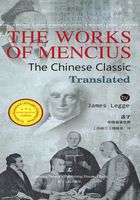
CHAPTER IV
1. King Hûi of Liang said, 'I wish quietly to receive your instructions.'


鸡豚 (a young pig) 狗 (the grain-fed, or edible dog) 彘(the sow) 之畜,—literally, 'as to the nourishing of the fowl', &c. 数口之家—the ground was distinguished into three kinds;—best, medium, and inferior, feeding a varying number of mouths. To this the expression alludes. 庠序. See on Bk. III. Pt. I. iii. Io.王, 4th tone,'to come to reign', 'to become regnant sovereign'.
5. Mencius now boldly applies the subject, and presses home his fault upon the king. 食人食,—the h to ret检食=制,secondieadgulate'.'4ttone.srsze,The phrase 不知检 is not easy;—the translation given accords with the views of most of the commentators.
CHAPTER 4. A CONTINUATION OF THE FORMER CHAPTER, CARRYING ON THE APPEAL, IN THE KLAISSST H PÛAIR'SA OGWRNA PGHO,V OENR NTMHEEN CTH. ARACTER OF


2. Mencius replied, 'Is there any difference between killing a man with a stick and with a sword ?' The king said, 'There is no difference!'
3. 'Is there any difference between doing it with a sword and with the style of government?' 'There is no difference', was the reply.
4. Mencius then said, 'In your kitchen there is fat meat; in your stables there are fat horses. But your people have the look of hunger, and on the wilds there are those who have died of famine. This is leading on beasts to devour men.
5. 'Beasts devour one another, and men hate them for doing so. When a prince, being the parent of his people, administers his government so as to be chargeable with leading on beasts to devour men,where is his parental relation to the people?'
6. Chung-nî said, 'Was he not without posterity whofirst made wooden images to bury with the dead? So he said, because that man made the semblances of men, and used them for that purpose:—what shall be thought of him who causes his people to die of hunger?'


1. 安, 'quietly', i.e. sincerely and without constraint. It is said 安对勉强, 看见其出于诚意.
2, 3. 有以异乎=有所以异乎,—literally, 'Is there whereby they are different?'
4. 野,—outside a town were the 郊 (chiâo), suburbs, but without buildings; outside the chiâo were the 牧(mû), pasture-grounds; and outside the mû were the 野(yê), wilds.
5. 且 has the force of 'and yet', i.e. though they are beasts. So that a 'how much more' is carried on, in effect, to the rest of the paragraph. 人恶之,—恶, 4th tone, the verb. 恶在,—恶, 1st tone,=何. 'Being the parent of the people', i.e. this is his designation, and what he ought to be.
6. 俑,—in ancient times, bundles of straw were made, to represent men imperfectly, called 刍灵, and carried to the grave, and buried with the dead, as attendants upon them. In middle antiquity, i.e. after the rise of the Châu dynasty, for those bundles of straw, wooden figures of men were used, having springs in them, by which they could move. Hence they were called 俑, as if 俑=踊. By and by, came the practice of burying living persons with the dead, which Confucius thought was an effect of this invention, and therefore be branded the inventor as in the text. 其无后乎,—the 乎 is partly interrogative, and partly an exclamation=nonne. 为, 3rd tone,=becomes. 如之何 is by some taken as= 'what would be (vix. Confucius) have thought', &c.? I prefer taking it as in the translation. The designation of Confucius by Chung-ni is to be observed. See Doctrine of the Mean, ii. I.

